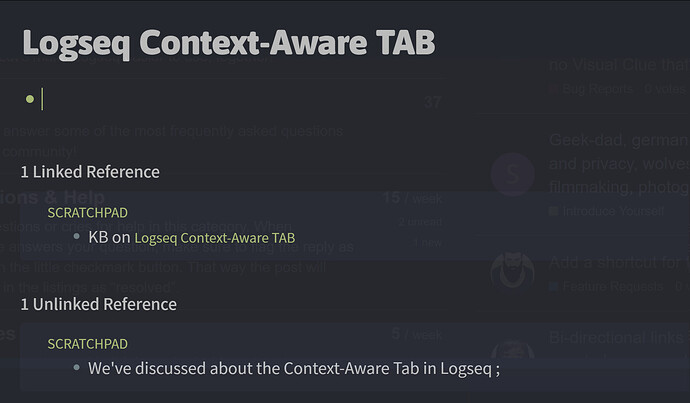Hello, I am noticing, as I make notes in the daily journal, that, often times, I am Linking and Tagging some blocks that are not really meant to be of prime importance or they are somewhat duplicate info.
I’ll try an example from the top of my head. I have a meeting with Bob and we discuss a Logseq Feature I’d like to be implemented, say Context-Aware TAB (sic) and I make a block note about this. Later on, when I would have researched the matter more closely and would have discussed it with other team members, I would make a block note about the actual details of this proposal. From the two captured notes, only one is a candidate for a prime spot for a Logseq Page Link, while the other would have Bob linked to it as the primary tag-receiver. But I also want to link my discussion with Bob to the actual matter just I don’t want it to be a result for a query on the topic at the same level as the actual KB I write or the proposal document. So i thought that I might use the Unlinked References for tangent-Links like this.
How would that work in practice:
- Had a meeting with [Bob]( [[Bob Penn]] ) and we discussed the feasibiliy of implementing a context aware system in Logseq for the TAB keystroke;
Normally one would create a Logseq Page, say [[Logseq Context-Aware TAB]] and would write the above note as:
- Had a meeting with [Bob]( [[Bob Penn]] ) and we discussed the feasibiliy of implementing a context aware system in Logseq for the TAB keystroke. #[[Logseq Context-Aware TAB]];
OR even better, using the Markdown Link Syntax:
- Had a meeting with [Bob]( [[Bob Penn]] ) and we discussed the feasibiliy of implementing [a context aware system in Logseq for the TAB keystroke]( [[Logseq Context-Aware TAB]] );
But that would be “Hard”-Linked to the Logseq Page, which would be on the same level in results with the more important kb note on the topic. So, instead of “Hard”-linking to the page and have it show up in Linked References or in Queries, a “designed for Unlinked References” would have the name of the Logseq Page with no brackets syntax so it would still resurface somehow, but not as a prime-importance query result:
For this I would use the Title of the Markdown Link Syntax so that I am free to write any text as the link description.
- Had a meeting with [Bob]( [[Bob Penn]] ) and we discussed the feasibiliy of implementing [a context aware system in Logseq for the TAB keystroke](.# "Logseq Context-Aware TAB" );
OR, using an invisible Markdown Link:
- Had a meeting with [Bob]( [[Bob Penn]] ) and we discussed the feasibiliy of implementing a context aware system in Logseq for the TAB keystroke. [](.# "Logseq Context-Aware TAB" );
The technical implementation is of second importance here, I am asking if `Designing for Unlinked References" is something that you think would improve note-taking, linking, resurfacing or it is flawed somehow and I would better stick with linking everything to show up at the same level of importance.


